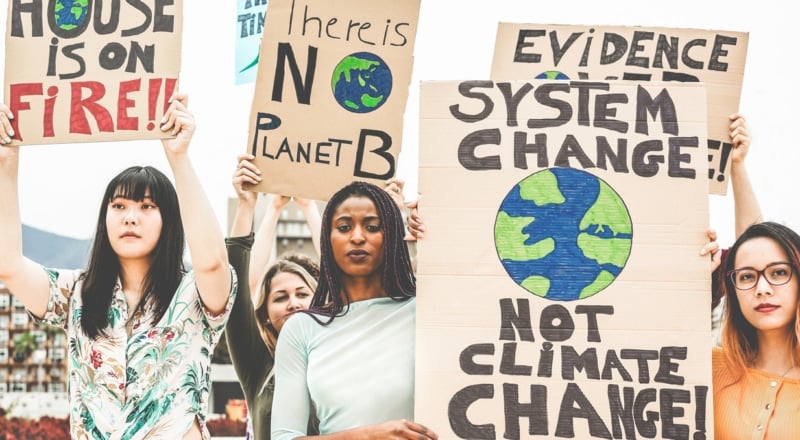How to contact politicians about the climate crisis
Make your voice heard and demand action from your leaders on the issue of climate change

The climate emergency is an issue that affects all of us, but young people are especially vulnerable to the effects of global warming because it puts their future at risk. Across the world and in Ireland, more and more young people have been standing up to protest the global response to the climate crisis, and to demand their leaders take action.
If you are worried about climate change and you want your government to do something, you can lobby your politicians and let them know how you feel. Lobbying is how people convince politicians to take action, support new policies, or change the law. It involves contacting a politician to let them know how you feel about an issue and what you’d like them to do about it.
Contacting politicians about climate change
When it comes to the issue of climate change, there are a lot of different levels of government where you can make your case. Who you go to will probably depend on what you’re asking for, and whether or not it’s a local, national, or international issue.
When contacting them, make sure to introduce yourself and let them know who you are, especially if you are in their constituency. Outline what your issue is and why it’s important to you, and let them know what you’d like them to do about it. Make sure to include information on the best way to reach you to respond.
Local: Contact your local councillors
A lot of positive changes that could be made to address the climate crisis can happen at a local level. Things like building safe cycling lanes, making public recycling bins available, improving the way land is used in the area and what it’s used for, and even how efficiently a city or town is laid out are all examples of things that can be done at the local government level.
Look at what’s happening in your area and what you think could be improved, and then let your local councillors know about it. Find out who your local councillors are by visiting your local authority website.
National: Contact government ministers or your local TD
If you have concerns about Ireland’s climate change policy and the progress the country is making as a whole, you can contact the minister who works for the relevant department, or ask one of your local TDs to bring the issue up in the Dáil.
Green Party T.D. Eamon Ryan is currently both the Minister for Environment, Climate and Communications and the Minister for Transport.
You can find out who your local TDs are on the Oireachtas website. You can contact them by email, phone, letter, or by visiting them in person when they hold a clinic in your area. If they are your local TD, make sure they know that you are in their constituency. This reminds them that they were elected to represent you and your interests, and that you can make a decision as to whether or not you want to vote for them in any future elections.
International: Contact your local Member of the European Parliament (MEP)
A lot of Ireland’s climate policy is shaped at the European Union (EU) level. When Ireland signed on to the international Paris Climate Agreement in 2015, their commitments were part of a wider EU climate action plan. If you have any concerns about what’s happening at a European level in relation to climate change, you can contact one of your local MEPs about it and ask them to address this in the European Parliament.
You can find your local MEP on the European Parliament website.
How to lobby the government about climate change
Once you know who to contact, you need to decide what you want to say to them. This involves learning as much as you can about the issue and knowing what you want them to do.
Learn about climate change
A good place to start is to learn more about climate change and global warming and the effects this has had in Ireland. It’s also a good idea to inform yourself about what Ireland has done so far, what our climate change targets are, and how we have been performing.
Here are some articles to read to get you up to speed on the issue:
- What is climate change?
- How does climate change affect Ireland?
- What is Ireland doing about climate change?
- What is the Paris Climate Agreement?
Learn about climate justice
Another issue to be aware of is climate justice. Climate justice is an idea for a fair society where both the burdens and benefits of addressing climate change are shared equally. Although climate change is a universal problem, the impacts of the escalating climate crisis (such as drought, flooding, or sea level rise) unequally impact different communities and regions. Climate justice aims to address this issue by supporting those who are most vulnerable to the climate crisis.
People often become politicians to help people, so by mentioning climate justice to them, they may take your argument more seriously. An example you could bring up with politicians is the idea of a ‘just transition’. Just transition aims to protect those who will need to switch jobs as a result of climate action. For example, as we move away from using fossil fuels like gas, those who work in the natural gas industry in Ireland will need to switch to different jobs. By asking politicians to support a just transition, those workers won’t be forgotten, and money could be invested in re-skilling those workers to switch to the renewable energy industry instead, such as in solar or wind power.
Know their record
If you are contacting an individual like a local councillor or TD, do some research on them and find out if they have talked about this issue before. Do a Google search to see if they have made any remarks in the media, if they have talked about it in the Dáil or the European Parliament, if they have voted for or against something climate related, or if it’s an issue they campaigned on. This will help you to get a better idea of their attitude towards the environment and climate change. It can also help to keep politicians true to their promises, by tracking what they’re doing and seeing if they are following through on all of the things they said they’d do.
If you’re contacting more than one person, this research can help you to figure out what sort of message you want to send them. Someone who denies climate change exists will probably get a different message and a different set of demands to someone who has been talking about this issue for a while.
Be prepared
If you are asking for a meeting face-to-face, or if you want to do a phone call, make sure you’re prepared. Take note of the key points you want to make and write down any facts or figures you want to bring up. You might also want to tell them why you’re doing this and why it matters to you, because showing you’re passionate about the topic and explaining why you believe it’s important could have a bigger impact than the facts that they likely already know.
It’s normal to feel nervous when making your case to someone like a politician. Remember to breathe and take your time. This person is your representative, and you have a right to have your thoughts on this issue heard.
Also, don’t assume that you have to meet a politician in-person to have an impact on their thinking. Political staff often have a big say in decisions that are made, especially when it’s their job to advise their politicians on policy or public relations. A meeting with a political staffer can be almost as useful to furthering your case as with the politician they work for.
Consider taking it one topic at a time
Climate change is a complex issue and there are a lot of different things that could be done. If you find you have a lot of different points you want to make, consider making them separately. There’s no reason why you can’t lobby the same person about the same or different topics more than once – taking it one topic at a time lets you go into more detail and get an idea of how they will respond in the future.
Team up with other people
If the idea of doing this alone seems daunting, see if you have any friends or if you can find a local environmental group who would be interested in taking part with you. You can all do the research, write the email or letter, and attend any meetings together. You can also support movements like Climate Case Ireland by signing their petition or join the Fridays for Future Ireland movement, run by young people in secondary school who are striking on Fridays to demand climate action.
This article was created as part of the Youth Climate Justice Challenge – a consortium project with ECO-UNESCO, SpunOut, Irish Girl Guides, Girls Brigade, No Name Club and Youth Irish Filmmakers and supported by the Dept. of Children and Youth Affairs.
Need more information?
Would you like more information? Maybe you would like to talk through your own situation? Get in touch through our online chat system for 16 to 25 year olds – Monday to Friday 4pm to 8pm.
- Chat now to a trained Youth Information Officer
- Or leave us a message and we will email you back






